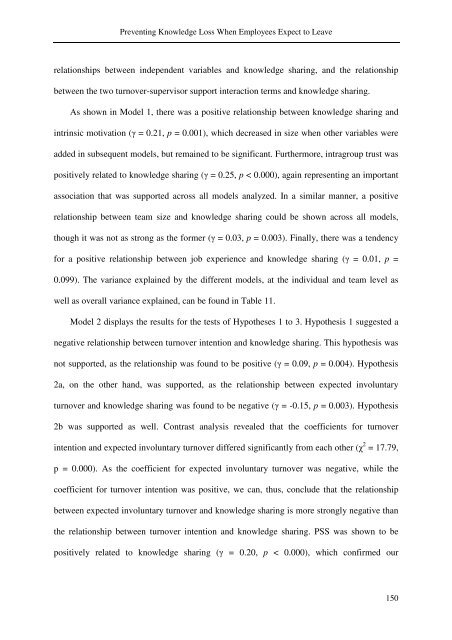thesis_Daniela Noethen_print final - Jacobs University
thesis_Daniela Noethen_print final - Jacobs University
thesis_Daniela Noethen_print final - Jacobs University
Create successful ePaper yourself
Turn your PDF publications into a flip-book with our unique Google optimized e-Paper software.
Preventing Knowledge Loss When Employees Expect to Leave<br />
relationships between independent variables and knowledge sharing, and the relationship<br />
between the two turnover-supervisor support interaction terms and knowledge sharing.<br />
As shown in Model 1, there was a positive relationship between knowledge sharing and<br />
intrinsic motivation (γ = 0.21, p = 0.001), which decreased in size when other variables were<br />
added in subsequent models, but remained to be significant. Furthermore, intragroup trust was<br />
positively related to knowledge sharing (γ = 0.25, p < 0.000), again representing an important<br />
association that was supported across all models analyzed. In a similar manner, a positive<br />
relationship between team size and knowledge sharing could be shown across all models,<br />
though it was not as strong as the former (γ = 0.03, p = 0.003). Finally, there was a tendency<br />
for a positive relationship between job experience and knowledge sharing (γ = 0.01, p =<br />
0.099). The variance explained by the different models, at the individual and team level as<br />
well as overall variance explained, can be found in Table 11.<br />
Model 2 displays the results for the tests of Hypotheses 1 to 3. Hypo<strong>thesis</strong> 1 suggested a<br />
negative relationship between turnover intention and knowledge sharing. This hypo<strong>thesis</strong> was<br />
not supported, as the relationship was found to be positive (γ = 0.09, p = 0.004). Hypo<strong>thesis</strong><br />
2a, on the other hand, was supported, as the relationship between expected involuntary<br />
turnover and knowledge sharing was found to be negative (γ = -0.15, p = 0.003). Hypo<strong>thesis</strong><br />
2b was supported as well. Contrast analysis revealed that the coefficients for turnover<br />
intention and expected involuntary turnover differed significantly from each other (χ 2 = 17.79,<br />
p = 0.000). As the coefficient for expected involuntary turnover was negative, while the<br />
coefficient for turnover intention was positive, we can, thus, conclude that the relationship<br />
between expected involuntary turnover and knowledge sharing is more strongly negative than<br />
the relationship between turnover intention and knowledge sharing. PSS was shown to be<br />
positively related to knowledge sharing (γ = 0.20, p < 0.000), which confirmed our<br />
150

















